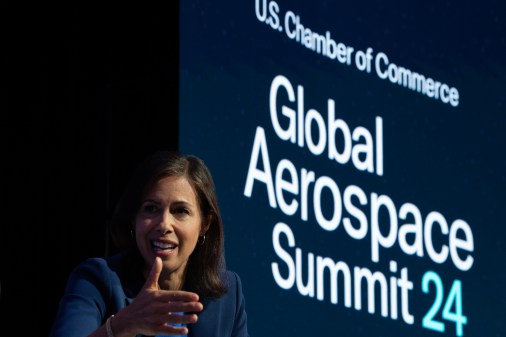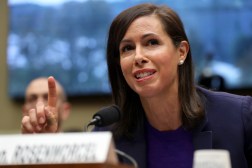FCC’s Rosenworcel: ‘We need more Wi-Fi’
At the State of the Net Conference Tuesday, Federal Communications Commissioner Jessica Rosenworcel addressed one of the most pressing issues facing the Internet.
Not net neutrality, the topic attendees expected her to discuss, but Wi-Fi.
Rosenworcel said the commission and private industry can release more unlicensed spectrum that can be used to improve the country’s wireless systems.
“Today our lives are not only dependent on wireless connectivity, they are deeply dependent on unlicensed spectrum, and Wi-Fi is an enormous part of that,” Rosenworcel said.
The Democratic commissioner highlighted three ways in which the country can better harness the potential of unlicensed spectrum: pushing the FCC bring more unlicensed spectrum to the marketplace at the 600 MHz band level, calling on the Congressional Budget Office to better account for the economic activity driven by Wi-Fi and stopping malicious the interference of Wi-Fi connections.
The last suggestion took aim at a number of hotel chains that have petitioned the FCC for the ability to block guests’ Wi-Fi connections due to “network security” issues. Last year, the commission fined Marriott International Inc. $600 million for blocking Wi-Fi connections in a Nashville hotel.
Rosenworcel called the petition a “bad idea,” saying there were other ways to address security concerns.
“Wi-Fi gives us choices, and those choices matter well beyond hotel rooms,” she said. “We live in a wireless world built on constant connectivity. Having more ways to connect in more places makes us stronger and will help grow out economy as the Internet grows less visible because it becomes a part of everything we do.”
That unlicensed spectrum, Rosenworcel stressed, has been a boon to the economy, accounting for $140 billion in economic activity.
Rosenworcel said her suggestions come after the FCC took similar risks when it first introduced unlicensed spectrum to the public in the ’80s, after people labeled the waves “garbage bands” when they were reserved for medical and scientific devices that ultimately were useless due to interference from microwave ovens.
“Wi-Fi is how we foster innovation,” she said. “That’s because the low barriers to entry for unlicensed airwaves makes them perfect sandboxes for experimentation. This is where we tinker. This is where we can explore new ideas for an Internet-enabled future at low cost.”
Rosenworcel said she hopes to work with her fellow commissioners on the hotel’s petition, aiming to “dismiss it without delay.”
“The state of the net owes a lot to the state of wireless connectivity,” Rosenworcel said. “I think the future of wireless connectivity will be stronger if we make some more room for more Wi-Fi.”





